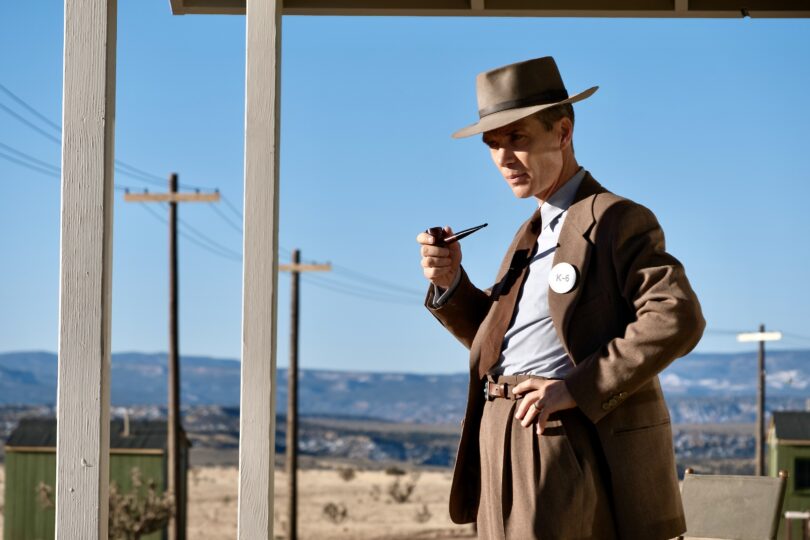The countdown has begun, as the first atomic bomb is about to explode.
It’s July 1945.
J. Robert Oppenheimer, the theoretical physicist in charge of the project, and many others sweat it out in the New Mexico desert as they watch the test from what they hope is a safe distance. Oppenheimer has told the military head of the operation, Lt. Gen. Leslie Groves, that chances of the explosion destroying the world are “near zero.” Groves’ response is that “zero” would be a much more comforting answer.
The intensity of the situation is almost unbearable.
Spoiler alert: The world was not destroyed. But, watching this unfold on the screen, waiting for the button to be pushed to set off the bomb, you can’t help but hold your breath and grip the armrests of your chair.
That alone tells you something about “Oppenheimer” (R, 180 minutes, in theaters). Christopher Nolan’s epic film bio/thriller is so gripping that you feel like you’re right there with Oppenheimer, anticipating the possible horrors his creation might unleash – never mind the horrors it did unleash.
In telling Oppenheimer’s story, writer-director Nolan (“Dunkirk,” “Inception”) tells a complex story about a complicated, brilliant man. Nolan doesn’t just focus on Oppenheimer’s involvement in the Manhattan Project, which led to the nuclear bombings of Hiroshima and Nagasaki, ending World War II. Among other things, it deals with Oppenheimer’s personal life, his Communist ties and the postwar political repercussions of his leftist leanings.
In covering all of this, and jumping back and forth in time in the process, Nolan presents an expansive story that seems oddly misshapen, in which, for instance, the third act, post-bomb, is extended into a story in itself.
In this case it doesn’t seem to matter much, though. (Another example where it doesn’t matter: “Lawrence of Arabia,” a magnificent epic whose first half is much stronger than the second.)
“Oppenheimer” is a breathtaking achievement, and for many reasons: the exceptional performances; Hoyte Van Hoyutema’s majestic cinematography (see this film on the largest screen possible); Ludwig Goransson’s grinding, buzzing soundtrack, which amps up the suspense; the intelligence on display (given my limitations, I had to assume much of the scientific dialogue made sense); the still-relevant moral questions the film asks regarding weapons and war, and the responsibilities of science and innovation.
Cillian Murphy plays Oppenheimer with the same restraint that makes his gangster character in “Peaky Blinders” so compelling. You’re not encouraged to like Oppenheimer, or even necessarily understand him. He’s an intellectual snob, a cold fish with an unpredictable moral compass (he has no apparent qualms about sleeping with friends’ wives, for instance). Outwardly, he celebrates the success of the atomic bomb, but he’s also tortured by that success and tells President Harry Truman (Gary Oldman, in one brief scene) that he feels he has blood on his hands (Harry doesn’t take this well).
Wearing a wide-brimmed hat and suit, Cillian’s Oppenheimer looks like a scientific gunslinger – a brainy variation on a Clint Eastwood or Gary Cooper Western character – as he strolls through the Los Alamos desert community he creates for his scientific team. He is the stuff of legend.
Members of the all-star supporting cast also are remarkable. Robert Downey Jr., in heavy makeup as a manipulative political figure out to destroy Oppenheimer’s reputation, and Emily Blunt, as Oppenheimer’s bitter, alcoholic wife, deliver Oscar-caliber portrayals as characters different from any they’ve played before (at least, that I’m aware of). Florence Pugh, as Oppenheimer’s Communist lover, and Matt Damon, as Groves, also are excellent. (Also in the cast: Oldman, Kenneth Branagh, Tom Conti – as Einstein, Casey Affleck, Jason Clarke, Benny Safdie, Josh Hartnett, Alden Ehrenreich, Matthew Modine … it’s quite the ensemble.)
All things considered, “Oppenheimer” could turn out to be the film of the year. If not, it’s going to be close. **** (out of four)
And then there’s ‘Barbie’
Much has been made about “Oppenheimer” and Greta Gerwig’s “Barbie” opening on the same day. Maybe it’s because they both are potential blockbusters in direct competition. Maybe it’s because of the filmmakers involved, since Nolan and Gerwig are about as highly regarded as anyone these days. Maybe it’s because it’s hard to imagine two films being more different.
“Barbie” (PG-13, 114 minutes, in theaters), co-written by director Gerwig (“Lady Bird,” “Little Women”) and Noah Baumbach (“The Squid and the Whale”), stars Margot Robbie as the living version of the famous Barbie doll, and Ryan Gosling as her (sort of) boyfriend, beach- and Barbie-obsessed Ken.
Barbie and Ken live with other variations of Barbie and Ken in Barbieland, where almost everything is pink and, according to Barbie, “Every day is the best day ever.” That is, until Barbie starts thinking of death, and visits Weird Barbie (Kate McKinnon), and learns about cellulite and other real-life phenomena. Barbie and Ken wind up heading out to the real world, where they are exposed to other things like, oh, the patriarchy, and Barbie befriends a mother, Gloria (America Ferrera), and daughter, Sasha (Ariana Greenblatt).
It’s a clever idea to use Barbie and Ken to explore gender roles and relationships, personal identity and so forth. If asked to name a toy for girls on “Family Feud,” no doubt Barbie would be first on the list, but the Mattel doll certainly can be, and has been, accused of setting up destructively unrealistic expectations in terms of body type and conforming to dated perceptions of women. Through this story, Gerwig suggests that Barbie – and even lunkhead Ken – can change with the times.
At the same time, the film expresses the exasperation of modern women – especially through an amazing speech delivered by Gloria about the impossible, contradictory demands placed on them.
“Barbie” has a lot of good qualities besides this speech. Robbie and Gosling go for broke as their silly characters (who struggle to understand where romance leads, given they have no genitalia), and they pull it off. The art direction involved in the creation of Barbieland – along with the costume design, the hair and makeup, etc. – brilliantly engulf you in a colorful fantasy world.
The problem is that a little amount of Barbie and Ken goes a long way, and the film eventually comes off as one-note. “Barbie” could have been a great “Saturday Night Live” skit, or even a series of “SNL” skits. But like some of those skits that have been turned into movies – “Coneheads” and the “Wayne’s World” movies come to mind – there’s not enough there to justify a feature-length film.
I’ve been told that people who grew up playing with Barbies will appreciate this film more for its inside jokes or for nostalgic reasons. That might be true. **½ (out of four)
** Click here for Tim Miller’s previous movie columns for Cape Cod Wave **
Please like Cape Cod Wave on Facebook.
Cape Cod Wave Magazine covers the character & culture of Cape Cod. Please see our Longform stories.
Tim Miller is co-president of the Boston Society of Film Critics. He teaches film and journalism at Cape Cod Community College in West Barnstable. You can contact Tim at [email protected] or follow him onTwitter @TimMillerCritic. Or you can ignore him completely.



































